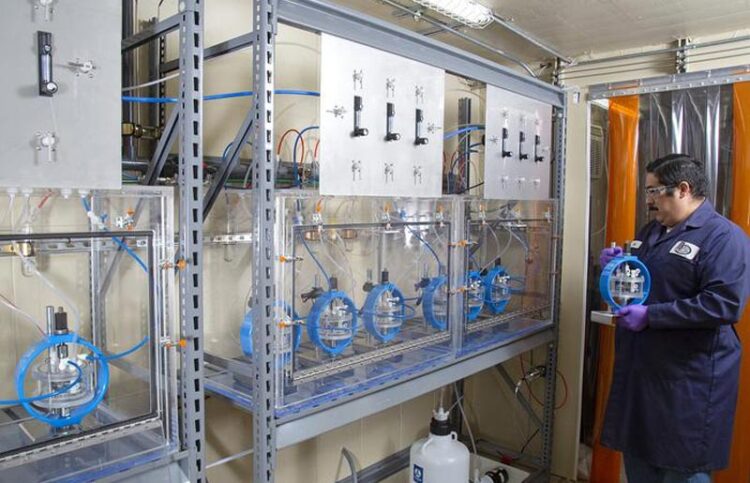Second Automotive Corrosion Symposium

Southwest Research Institute will host the Automotive Corrosion Symposium in Detroit April 11-12. The event is designed to foster communication among corrosion experts from within automotive original equipment manufacturers (OEMs) as well as material, paint and other automotive suppliers over a wide spectrum of industry-identified corrosion issues. SwRI has more than four decades of experience in corrosion and materials failure research. Pictured is the Institute’s dedicated facility for cost-efficient standard corrosion testing.
Credit: Southwest Research Institute
Event brings together corrosion experts and automotive industry professionals.
Southwest Research Institute will host its second Automotive Corrosion Symposium in Detroit April 11-12. The event, first held in 2022, is designed to foster communication among corrosion experts from within automotive original equipment manufacturers (OEMs) as well as material, paint and other automotive suppliers over a wide spectrum of industry-identified corrosion issues.
“Corrosion is a concern within the automotive industry, not just for cosmetic reasons, but because it can affect functionality and safety,” said SwRI Staff Engineer James Dante, one of the organizers of the event. “As the industry is driven toward high-strength, lighter-weight materials with significantly different corrosion properties, this concern is heightened.”
The symposium is organized by industry professionals addressing automotive corrosion from a variety of technical perspectives. This year’s theme is “Applied Corrosion Science for Next-Gen Vehicles.” The organizing committee is accepting abstracts for papers, presentations and posters through February 23. Abstracts can be submitted through the link below.
“The automotive industry is working to reduce emissions as it develops next-generation vehicles,” Dante said. “Whether improving fuel efficiency or pivoting toward electric vehicles, the need for lightweight, strong materials is exploding. These materials must be inherently corrosion-resistant or suitable protection systems are needed to prevent corrosion.”
SwRI has more than four decades of experience in corrosion and materials failure research. A multidisciplinary group of engineers and scientists offer a comprehensive approach to solving corrosion problems for government and industry. The Institute is home to corrosion testing laboratories that characterize materials in a wide array of caustic environments and develop corrosion-resistant materials and coatings to withstand the harshest environments.
For more information or to register to attend the event, visit https://www.swri.org/event/automotive-corrosion-symposium.
Media Contact
Joanna Quintanilla
Southwest Research Institute
jquintanilla@swri.org
Office: 210-522-2073
All latest news from the category: Automotive Engineering
Automotive Engineering highlights issues related to automobile manufacturing – including vehicle parts and accessories – and the environmental impact and safety of automotive products, production facilities and manufacturing processes.
innovations-report offers stimulating reports and articles on a variety of topics ranging from automobile fuel cells, hybrid technologies, energy saving vehicles and carbon particle filters to engine and brake technologies, driving safety and assistance systems.
Newest articles
Faster, more energy-efficient way to manufacture an industrially important chemical
Zirconium combined with silicon nitride enhances the conversion of propane — present in natural gas — needed to create in-demand plastic, polypropylene. Polypropylene is a common type of plastic found…

Energy planning in Ghana as a role model for the world
Improving the resilience of energy systems in the Global South. What criteria should we use to better plan for resilient energy systems? How do socio-economic, technical and climate change related…

Artificial blood vessels could improve heart bypass outcomes
Artificial blood vessels could improve heart bypass outcomes. 3D-printed blood vessels, which closely mimic the properties of human veins, could transform the treatment of cardiovascular diseases. Strong, flexible, gel-like tubes…





















